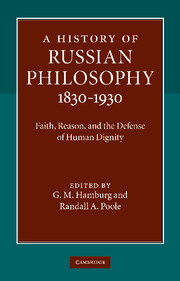Book contents
- Frontmatter
- Contents
- List of contributors
- Acknowledgments
- Introduction: The humanist tradition in Russian philosophy
- I The Nineteenth Century
- 1 Slavophiles, Westernizers, and the birth of Russian philosophical humanism
- 2 Alexander Herzen
- 3 Materialism and the radical intelligentsia: the 1860s
- 4 Russian ethical humanism: from populism to neo-idealism
- II Russian Metaphysical Idealism in Defense of Human Dignity
- III Humanity and Divinity in Russian Religious Philosophy after Solov′ëv
- IV Freedom and Human Perfectibility in the Silver Age
- V Russian Philosophy in Revolution and Exile
- Afterword: On persons as open-ended ends-in-themselves (the view from two novelists and two critics)
- Bibliography
- Index
4 - Russian ethical humanism: from populism to neo-idealism
Published online by Cambridge University Press: 05 June 2012
- Frontmatter
- Contents
- List of contributors
- Acknowledgments
- Introduction: The humanist tradition in Russian philosophy
- I The Nineteenth Century
- 1 Slavophiles, Westernizers, and the birth of Russian philosophical humanism
- 2 Alexander Herzen
- 3 Materialism and the radical intelligentsia: the 1860s
- 4 Russian ethical humanism: from populism to neo-idealism
- II Russian Metaphysical Idealism in Defense of Human Dignity
- III Humanity and Divinity in Russian Religious Philosophy after Solov′ëv
- IV Freedom and Human Perfectibility in the Silver Age
- V Russian Philosophy in Revolution and Exile
- Afterword: On persons as open-ended ends-in-themselves (the view from two novelists and two critics)
- Bibliography
- Index
Summary
Russia's desultory performance in the Crimean War against the western powers in the 1850s demonstrated to government and educated society the efficient power of an industrial economy as well as the inflexibility of a serf army. The following years, known as the era of great reforms, saw the emancipation of the peasants and other measures, including the 1864 judicial reform, which introduced the principle of equality before the law. Revised university statutes led to soaring student enrollment. Many university students and some recent graduates now looked to the burgeoning natural sciences for answers to pressing social problems. However, some Russians viewed an unbridled positivism with caution, even alarm. They were concerned above all with the human and moral implications of an outlook that seemed to submerge the individual in a mechanistic world. This chapter will focus first on the ethical humanism of the two greatest theorists of Russian populism, Pëtr Lavrov and Nikolai Mikhailovskii. It will then explore how these figures were themselves eclipsed at the turn of the century by philosophical thinkers of a younger generation, whose critique of positivism took them from revisionist Marxism to neo-idealism in search of the true nature of ethical values.
LAVROV'S ETHICS
The son of a former colonel, Pëtr Lavrovich Lavrov (1823–1900) was educated at the Mikhailovskii Artillery School, where, after graduating, he taught mathematics. Somewhat incongruously, perhaps, given his profession and military rank, Lavrov also began writing poetry and articles on pedagogy.
Keywords
- Type
- Chapter
- Information
- A History of Russian Philosophy 1830–1930Faith, Reason, and the Defense of Human Dignity, pp. 90 - 108Publisher: Cambridge University PressPrint publication year: 2010



